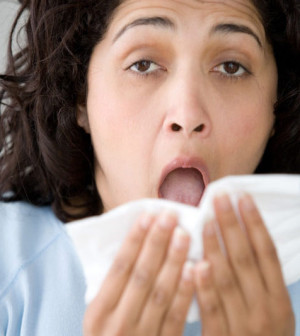- Could Your Grocery Store Meat Be Causing Recurring UTIs?
- Are You Making This Expensive Thermostat Error This Winter?
- Recognizing the Signs of Hypothyroidism
- 10 Strategies to Overcome Insomnia
- Could Artificial Sweeteners Be Aging the Brain Faster?
- Techniques for Soothing Your Nervous System
- Does the Water in Your House Smell Funny? Here’s Why
- Can a Daily Dose of Apple Cider Vinegar Actually Aid Weight Loss?
- 6 Health Beverages That Can Actually Spike Your Blood Sugar
- Treatment Options for Social Anxiety Disorder
An Expert’s Guide to Sneezin’ Season

This could be a bad spring allergy season and people with allergies need to be prepared, an expert warns.
“With the crazy up and down weather, some parts of the country could see worse allergy-provoking conditions. There is likely to be a pollen superburst this season, so sufferers should get ready,” Dr. Jordan Josephson, a sinus specialist at Lenox Hill Hospital in New York City, said in a hospital news release.
“It promises to be a nasty spring,” he added.
It’s crucial to deal with allergy symptoms immediately, according to Josephson.
“Allergies left untreated can cause sinus swelling leading to chronic sinusitis. Allergies can also affect your digestive tract. Gastroesophageal reflux disease (GERD) can be a direct response of the allergic response. So allergies can seriously affect your quality of life. Just ask any allergy or sinus sufferer,” he said.
Dr. Punita Ponda is assistant chief in the division of allergy and immunology at Northwell Health in Great Neck, N.Y. She suggested that if you know you have spring allergies, start taking allergy medication at least one to two weeks before the start of allergy season. Then continue taking it throughout the season, she noted in the news release.
Josephson outlined a number of other ways to keep your allergy symptoms under control, including: staying indoors as much as possible between 10 a.m. and 4 p.m., when pollen counts are highest; using your air conditioner, which cleans and dries the air; keeping doors and windows closed; and using an air purifier.
After being outdoors, remove your clothes and wash them immediately. Keep pollen-exposed clothes separate from clean clothes. You should also take a shower after being outside in order to remove pollen from your skin and hair, he suggested.
In addition, irrigate your sinuses daily to flush out pollen. And take antihistamines, but try to avoid decongestants.
More information
The American Academy of Family Physicians has more on seasonal allergies.
Source: HealthDay
Copyright © 2026 HealthDay. All rights reserved.










